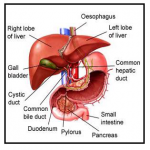Symptoms Of Liver Damage
Jaundice, Nausea, Upper Abdominal Pain are the most common signs.
Other symptoms include disorientation, fatigue and a general sense of weakness. Weight loss or easy bruising may also occur in individuals with liver damage.
What Is The Liver?
The liver is responsible for a large variety of functions in the human body, including digestion, production of glucose, iron storage and the metabolization of active ingredients in medications. While the liver is the only organ in the body capable of restoring its damaged tissues, if more than 75 percent of cells are damaged, complete liver failure can occur and the body will begin to shut down.
Liver damage can occur for a variety of reasons, among them hereditary disease, illness and lifestyle choices. Sometimes, liver damage is a direct result of medications and other chemicals that are put into the body.
Types Of Liver Damage
Various types of liver damage and disease include cirrhosis, hepatitis B and C, hemochromatosis, Wilson’s disease and more. While a large number of diseases affect the liver, liver damage is primarily categorized as either chronic or acute. Chronic liver damage occurs over time and is generally the result of hereditary illnesses, long term consumption and abuse of alcohol, malnutrition, hepatitis and other long term illnesses. In contrast, acute liver damage occurs quickly, sometimes over a matter of days. The liver rapidly loses its ability to function correctly and other organs may become affected, causing systemic organ failure. While acute liver damage can result from some viruses and diseases, it is more often a result of an overdose or reaction to medications.
Who Is Affected By Liver Damage?
While liver damage may occur for a variety of reasons, those most at risk include individuals with a history of alcohol or drug abuse, people taking certain prescription medications, and patients with a pre-existing form of liver disease such as hepatitis. Since acute liver damage is often the result of certain kinds of medications, patients taking these prescriptions are at a higher risk for developing liver damage. Individuals who consume more than the recommended dosage of some over-the-counter pain relievers or natural supplements are also at an increased risk for developing liver damage.
Medications Can Cause Liver Damage
Acetaminophen is the primary type of medication linked to liver damage. Taking too much Tylenol or other medications containing acetaminophen is one of the most common causes of acute liver failure. Liver damage can occur as a result of taking too much of this medication at once or from taking more than the recommended dosage over a long period of time.
Some prescription drugs such as antibiotics, anticonvulsants and anti-inflammatory medications may cause liver damage. Some cholesterol lowering medications can also damage the liver. Individuals on these types of medications should be monitored and tested regularly for any signs of liver damage.
Some herbal supplements have also been implicated in liver damage. Natural products are not necessarily completely safe. Many natural and herbal supplements are not properly tested before going on the market. In some instances, the herb itself causes liver damage; in other cases, toxins introduced during the manufacturing process are to blame. Herbal supplements linked to liver failure include chaparral, kava, skullcap, pennyroyal and ephedra. Vitamin supplements can also be damaging to the liver if not taken in the recommended dosage amounts, as an excess of vitamin A or iron can cause liver damage.

